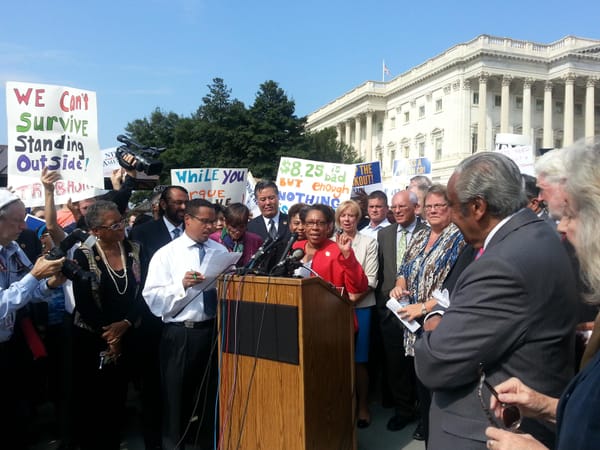On Pardons in the Liberal Tradition

For many businesses, this time of year is a sort of limbo, where weeks are short and interrupted by holidays, with employees traveling, watching over vacationing kids, or nursing the aftereffects of holiday cheer. For the judiciary and the White House, however, this is a busy season indeed - the season of a last-minute pardons that would have been politically toxic to complete before an election. With Biden an outgoing president whose age precludes any future career, these pardons are likely to be far reaching, and already we've seen very large scale clemency actions, both for death row inmates and those placed on house arrest due to COVID. That makes it a good time to examine the role of these extra-judicial mercies in a liberal society.
The pardon and commutation powers are largely a holdover from royal prerogatives in an earlier age, and the sweeping, unchecked authority the president has here is a bit jarring compared to the constrained agency that office enjoys in the rest of the constitution. There distinct opinions within the liberal tradition on whether this power is wise to grant - one which argues that this sort of sweeping power is necessary to check the justice system, and another which argues it is ultimately an arbitrary relief to overharsh sentences where legislative remedies would be favored.
The US Constitutional Argument
Alexander Hamilton, in Federalist 74, defends the pardon power even in cases of treason, where he indicates it is most controversial. The argument is similar to his defense of several other executive powers: first, that "a single man of prudence and good sense is better fitted, in delicate conjunctures, to balance the motives which may plead for and against the remission of the punishment, than any numerous body whatever". Thus, per Hamilton, the president can better decide on questions of pardon and clemency than any other body collected for the purpose. The assumption is that in some cases the pardon power is appropriate, and it is simply a question of who shall exercise it. This is well in keeping with the liberal assumption about the fallibility of the judiciary (and any other government institution) - since, as James Madison noted, men are not angels, it is desirable to have a safety valve to check particular judicial excesses, or even simply judicial inability to keep adapt sentences to every possible circumstance.
The second argument Hamilton offers for the pardon power is for keeping the general peace - " in seasons of insurrection or rebellion, there are often critical moments, when a well-timed offer of pardon to the insurgents or rebels may restore the tranquillity of the commonwealth". I would argue we've seen this power used both well and poorly - the frequent pardons and commutations offered by Andrew Johnson after the Civil War, for example, may have restored tranquility, but they did so at the price of justice and to the detriment of an entire race of people. The promise of a pardon may have given Nixon more incentive to resign rather than be impeached, but one could argue that this just emboldened future presidents. On the other hand, examples like Carter's pardon of draft dodgers or Clinton's pardon of Puerto Rican independence militants likely served the function Hamilton envisioned, allowing society as a whole to move on from particularly violent or contentious periods. It is notable, though, that these pardons did not function in nearly so time sensitive a fashion as Hamilton envisioned. Fortunately, it is rarely been the case a 'season of insurrection' has required the down to the hour pardon negotiations that Hamilton envisioned the power being used for, but it is certainly a possibility in the future.
A Contrasting Enlightenment Opinion
By contrast, a near-contemporary of Hamilton and Madison who wrote extensively on the judiciary, Cesare Beccaria, disagreed with his role of pardons. In his 1764 work On Crimes and Punishments, the Enlightenment thinker wrote that "Clemency, which has often been deemed a sufficient substitute for every other virtue in sovereigns, should be excluded in a perfect legislation, where punishments are mild, and the proceedings in criminal cases regular and expeditious." To him, the power of clemency appeared necessary in countries where the 'absurdity of laws' brought about undue punishments, but it was an imperfect fix that could impede a broader reform. If the most sympathetic of convicts are pardoned or granted clemency, it might in fact reduce public pressure for broader reforms that could benefit thousands of prisoners whose stories never make a big enough splash to build a movement for their individual pardons.
Moreover, Beccaria found the process of pardoning detrimental to creating an orderly society where the laws were broadly respected. "To shew mankind," he writes, "that crimes are sometimes pardoned, and that punishment is not the necessary consequence, is to nourish the flattering hope of impunity, and is the cause of their considering every punishment inflicted as an act of injustice and oppression." This has at least two negative effects. For one, actually dangerous criminals - especially those who think they can garner sympathy from the executive, may feel emboldened. More insidiously, arbitrary mercy an also make any punishment, even if perfectly proportional and mild, seem equally arbitrary, since after all it could have been forestalled with the stroke of a pen. There is also a way in which the executive ends up 'legislating' through pardons, or lack thereof. Biden's decision not to commute the sentences of three death row inmates - a terrorist who bombed the Boston marathon and two mass shooters who committed racially/ethnically motivated massacres - effectively established parameters under which the death penalty is acceptable - in cases of terrorism or something akin to it - without input from the legislature. Better, in Beccaria's view, to write more merciful legal codes that could obviate the need for executive intervention and better preserve this separation in duties.
The Modern Situation
In an era of mass incarceration and given the fallibility of the judiciary, I am inclined to see the wisdom of Hamilton's position. Biden's ability to cancel the executions of dozens and the reincarceration of hundreds of people is an insufficient antidote to mass incarceration but it's better than not having it. However, there are a few cases that turn Hamilton's reasoning on its head, and where the broad constitutional grant of pardon and clemency power is reckless.
The most controversial of Biden's commutations is the case of Michael Conahan, the so-called 'cash for kids' judge who sentenced minors to a for-profit juvenile detention center in exchange for kickbacks. The use of the president's commutation to commute the sentences of members of the judiciary itself runs a greater risk to liberty than other commutations and pardons, because it actually erodes on check on the justice system. If corrupt judges can be 'bailed out' by the president, the hope for pardon could interfere with their judicial independence and render our safeguards against encroaching police power moot.
Two other cases bring this into starker relief - former president Donald Trump's pardons of American war criminals who fought in the 'War on Terror' as well as his pardon of Sheriff Joe Arpaio. Here we have agents of the state committing violence and oppression and (belatedly and very lightly) held to account for their actions, only to be bailed out by the president. In both cases, this would seem to accelerate the president's plans for using violence at home and abroad against 'undesirable' groups, and the 'hope of impunity' Beccaria warned about is a powerful tool for a president seeking loyal agents of extrajudicial state violence.
Mercy may be a virtue, and the ability to have on individual re-think the potential excesses of the judiciary may have value. However, when the state has the capacity to extend arbitrary mercy to its own agents, the effects are to erode the very idea of limited government, accountable to the law. Within the constitution as written there is no way for the legislature to limit the president's pardon and commutation power, nor is it possible to make certain crimes or individuals outside that power. A long-term solution would be to, if possible, limit the power of pardon and commutation via constitutional amendment, potential to require legislative approval of those pardons or commutations that impact certain agents of state violence. This might be non-partisan enough to eventually gain support from most states, though every proposal to formally amend the constitution is close to a lost cause barring some cataclysmic pardon scandal.
Aside from that, avoiding the kind of self-mercy that upholds government power is substantially more difficult, but not entirely impossible. There are avenues the president cannot touch - state convictions, for example, or civil suits. Weakening the doctrine of qualified immunity would strengthen the latter, while electing state officials properly skeptical of judiciary and police overreach can help with the latter. Relying on Federal charges to make up for State inability to prosecute lawless law enforcement, as with Sheriff Arpaio, is not a viable strategy. And at the state level, constitutional change to prevent a similar abuse of power is more possible and just as urgent - as the case of a Kansas City police officer convicted and sentenced for killing a Black man, only to have that sentence commuted, shows.
And the question of state level law enforcement is also where liberals should deal with perhaps the more pernicious effect of the selective mercy of the pardon - the lack of pressure to create more leniency within the legal system. No doubt there are good examples where a gubernatorial commutation truly did mitigate a miscarriage of justice, or where a pardon helped an individual or class of people re-enter society more smoothly. But these cases should be used as a platform to explore who else might find themselves stuck in these situations, working with the goal of making the sort of legal code Beccaria imagined



